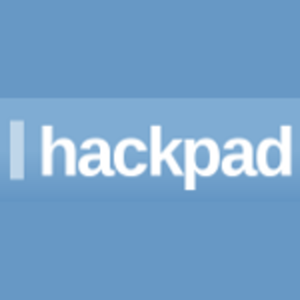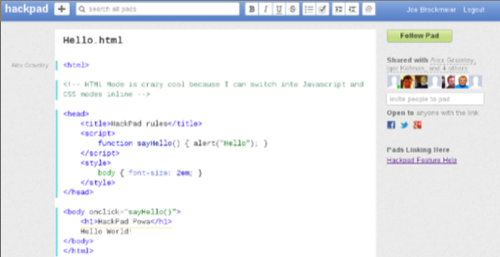After catching a note about the wiki for SXSW being edited with Hackpad, I thought it might be worth a look. Then I caught the tagline, “best wiki ever.” Well, that’s a bold statement. Then I noticed that Tomboy creator Alex Graveley was part of the team behind it and thought maybe it really is. After a short test drive, I’m even more impressed. Hackpad combines the simplicity of Tomboy with real-time collaboration features that make it a great lightweight tool for teams.

Tomboy, for folks who haven’t spent much time on Linux, is a wiki-like desktop note-taking application written in Mono. It’s been ported to other platforms, but has been most widely used on Linux. For many years, Tomboy was one of my go-to apps. As I’ve used more and more Web-based software, I’ve gotten out of the habit of using Tomboy.
Trying Hackpad
Hackpad is open for sign-ups. You can register with your email address, Facebook or Google accounts. I was going to use my Google account, but Hackpad wanted access to my Google Contacts info too.
Once you’re signed up, you can start creating new pads. Hackpad provides most of the features you’d expect from wikis, and a number of features that you wouldn’t expect.
The collaboration features allow you to invite users to your “pads” and edit documents in real time. There’s a very slight lag when another user is editing the same pad, but it’s negligible.
If you’re working on code of some sort, Hackpad offers syntax highlighting for HTML, JavaScript, C, SQL, Java, CoffeeScript, and a number of other languages and markup syntaxes.
You can create a new pad while you’re editing another one by using “@” symbol. This makes it really easy to create new pads and you don’t have to use the normal annoying wiki syntax for pages. You can also “notify” people who have Hackpad accounts with the @username syntax, which will send them an email.
Hackpad also supports to-do lists, just by dropping in a “[]” you can add a checklist item. This makes it dead easy to create a checklist for a team, or just for yourself.
Hackpad supports rich media, if you drop in links from supported sites. For instance, drop in a link to a YouTube video and you’ll get a preview of the video. This also works with Vimeo, SoundCloud, Flickr, Slideshare, Google Maps, TED, and a number of other sites.

The privacy settings are pretty straightforward. You can have private pads, pads that are open to anyone with the link, or public pads. It is possible to un-invite folks, so if you have a team member leave the company, they can be removed from each pad.
You can also create collections of pads, which makes it easy to collect and share documentation or other materials without having to slap everything into one pad.

Want to bail on Hackpad? Unlike Tomboy, Hackpad is not open source. But they do allow you to grab all of your pads as a zip file. Unzipped, you get pretty standard (if unpleasantly formatted) HTML. So there’s not too much concern about lock-in, since it shouldn’t be ridiculously difficult to import Hackpads into a different wiki.
Evolution of Hackpad
The Dropbox integration is an interesting idea, but it doesn’t quite work flawlessly just yet. You’re supposed to be able to attach a file from Dropbox by typing “@filename,” but in my testing of Hackpad it didn’t find many of the files I wanted to attach. With any luck, this is a feature that they’ll have worked out before too long.
I like Hackpad enough that I’d be more than happy to pay for an account, if only I could. Right now they have a sign-up to get into a limited test for Pro accounts, but you can’t just sign up for one and offer the company some money. Here’s hoping they’ll have that bug fixed pretty soon. The Pro accounts should allow companies to sign up with their own address (like “yourcompany.hackpad.com”) and import MediaWiki and Google Sites Wikis. The Pro accounts will also come with admin tools and 24/7 support.
If you need a lightweight collaboration tool, or just a personal wiki, I’d recommend checking it out. The tour of Hackpad is the best place to start.










